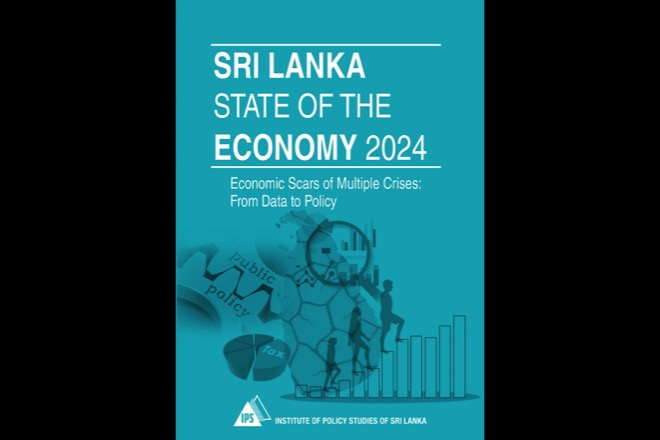The Institute of Policy Studies of Sri Lanka (IPS) recently hosted a knowledge-sharing and networking event to mark the release of its annual flagship report, Sri Lanka: State of the Economy 2024. This year's report, themed “Economic Scars of Multiple Crises: From Data to Policy,” presents a comprehensive analysis of Sri Lanka's ongoing economic recovery, outlining the socio-economic challenges ahead and the policy choices that will shape the country’s future.
Speaking on Sri Lanka’s macroeconomic environment, the IPS’ Executive Director, Dr Dushni Weerakoon emphasised the country's constrained policy options in its fragile recovery phase. “Sri Lanka has very limited policy tools to provide relief and boost output recovery”, she noted, stressing that “the more prudent option is to look at ways and means of marginal changes on tax and spending policies to address distributional concerns”. In this respect, the report’s key findings, using the most recently available data provided a foundation for discussions during the event.
Revisiting Taxes and Spending for Greater Equity
Recent increases to VAT rates and removal of exemptions are found to hurt the poorest income decile the most. IPS Research Economist Priyanka Jayawardena noted that they spend around 10% of their income on VAT compared to 6% for higher-income groups. By contrast, direct income taxation like Pay-As-You-Earn (PAYE) and Personal Income Tax (PIT) were found to be highly progressive. “The richest 10% of households contribute as much as 95% of PAYE and PIT,” Jayawardena explained. But, the findings also reveal a high degree of tax evasion. From the estimated PIT payable of LKR 131 billion, less than one-third (LKR 43 billion) appears to have been collected in 2023.
Improving Welfare Targeting through Aswesuma
Dr Pulasthi Amerasinghe, Research Economist, IPS noted that despite the broader multidimensional approach and better targeting criteria adopted under the Aswesuma welfare programme is more effective. The data show that “only about 54% of former Samurdhi beneficiaries are eligible for Aswesuma under the 22 criteria”. The analysis points to better targeting on the 22 criteria when Aswesuma and Samurdhi beneficiary household deprivations are examined in detail.
Worryingly, though, the analysis also reveals that as per HIES data, nearly 40% of food-insecure households were not eligible under the Aswesuma criteria. Simulation analysis shows that food insecurity is one of the first deprivations to be felt in times of crises, with more than 21% of Aswesuma beneficiaries impacted. Given this and the increasingly more frequent climatic impacts on food availability, Dr Amerasinghe recommended incorporating these as additional criteria for eligibility.
Preparing Youth for Work and Securing Decent Jobs
IPS Director of Research, Dr. Nisha Arunatilake, highlighted Sri Lanka’s challenges in youth employment and education based on recent Labour Force Survey data. She noted that “while education participation drops after 16 years of age, there has been an improvement since 2018, especially in vocational training”. However, she went on to highlight a bigger concern that 65% of youth in the age of 20-24 are not participating in any kind of education which means that “they are entering the labour force with low skills”. Given the technological advancements and skills in demand, this does not bode well for Sri Lanka’s labour market productivity.
These concerns were supported by the findings presented by IPS Research Officer, Suresh Ranasinghe, who highlighted a concerning decline in high-skilled employment, which fell from 23% in 2018 to 20% in 2023, accompanied by a dramatic halving of managerial positions during this period. “This decline is largely driven by the emigration of skilled workers seeking better wages abroad, exacerbated by the falling real incomes in Sri Lanka,” Ranasinghe explained.
Insightful Discussions and Forward-Looking Solutions
With over 100 participants attending from the government, private sector, development partners and research organisations, the thought-provoking sessions also looked at other key issues on health spending, public sector wages, the pros and cons of engaging in regional trade deals, the impact of energy pricing on export competitiveness and agriculture sector export diversification. Many of these issues are captured in the Sri Lanka: State of the Economy 2024 report which offers valuable insights into the country’s economic landscape, highlighting both progress and ongoing challenges.
The IPS report is available for sale at IPS, No. 100/20, Independence Avenue, Colombo 07, and at leading bookshops island-wide.



“CANNOT AGREE MORE” with IPS flag ship report reference VAT TAX.
crippling the Poor.. Last June 2023 pension under went a extra charge
Rs.1.129.00 in addition to forex & bank charges by friendly Peoples Bank.
sorry, correction amount should read Rs.10.129.60
Thanks.